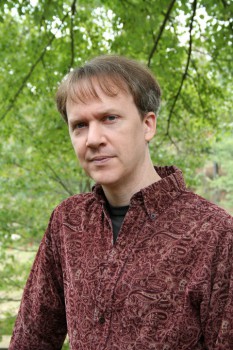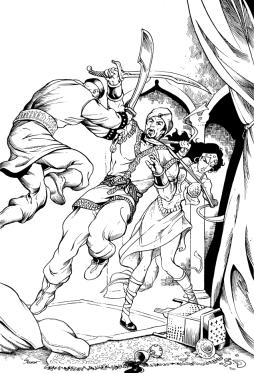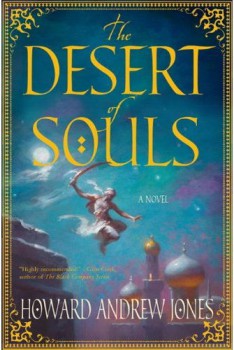Black Gate Interviews Howard Andrew Jones, Part One
 The great thing about interviewing Howard Andrew Jones is that it is impossible to run out of interesting things to talk about. That’s because Howard has been busy. Busy writing stories, busy preserving the legacy of an unsung founder of historical adventure, busy editing Black Gate Magazine. And, oh yeah, busy writing and selling novels — his first two, the Dabir and Asim origin story The Desert of Souls, and Plague of Shadows for Paizo’s new Pathfinder fiction line, are both due out this month!
The great thing about interviewing Howard Andrew Jones is that it is impossible to run out of interesting things to talk about. That’s because Howard has been busy. Busy writing stories, busy preserving the legacy of an unsung founder of historical adventure, busy editing Black Gate Magazine. And, oh yeah, busy writing and selling novels — his first two, the Dabir and Asim origin story The Desert of Souls, and Plague of Shadows for Paizo’s new Pathfinder fiction line, are both due out this month!
In this first installment of a multi-part interview with Howard, he talks about his new Dabir and Asim novel and the relationship between historical and fantasy writing.
A Conversation with Howard Andrew Jones
Your Dabir and Asim stories are some of the most popular to be featured in Black Gate Magazine. For those readers perhaps still unfamiliar with them, what can one expect from a Dabir and Asim tale? More specifically, what is in store for readers that pick up Dabir’s and Asim’s first novel-length adventure, The Desert of Souls?
Mystery, adventure, swashbuckling swordplay, two brave friends standing against things man was not meant to know… to further sound like a radio announcer, there’s all this and more! I think my two favorite descriptions about their exploits come from John O’Neill and Kevin J. Anderson. O’Neill described their tales as “something like Sherlock Holmes crossed with the Arabian Nights, except Watson has a sword,” and Kevin J. Anderson wrote that the novel read “like a cross between Sindbad and Indiana Jones.” There’s a strong sense of the exotic, because I like to take readers to strange and colorful places, be it a haunted tower in the Baghdad night, or ancient ruins. I had a lot more room to spread out in the novel, so the readers are introduced to more figures from Dabir and Asim’s world, including the brilliant Sabirah, Dabir’s one true love, and the caliph himself.
______________
 What were origins of Dabir and Asim? Would you say developing them first as short story characters was an asset when it came time for the novel? Did you at all find yourself having to unlearn certain approaches to storytelling or characterization when it came to adapting them to a longer form?
What were origins of Dabir and Asim? Would you say developing them first as short story characters was an asset when it came time for the novel? Did you at all find yourself having to unlearn certain approaches to storytelling or characterization when it came to adapting them to a longer form?
I don’t know exactly where they came from, but I’m pretty sure they developed because I’d immersed myself in the historical fiction of Harold Lamb and Robert E. Howard. One day Asim was just… there, ready to start talking about his adventures with his friend Dabir. I could hear the tone of his voice long before I knew his full background. I wish I was always so fortunate with a character. As for the short stories, you bet those were helpful. With them I got to think about my characters and their interactions for years. I was effectively getting years of practice and background research out of the way, though I didn’t know it at the time. The novel was a new story, but it was about people I knew well because of the groundwork I’d already laid. There were a few things to unlearn, most notably Asim’s precise role. Earlier on he had always referred to Dabir as “master,” for I had first imagined Asim as Dabir’s servant, even though they relied upon one another to succeed. By the time I started work on their real origin story I realized that they saw each other as partners, not as employer and employee. If I should be so lucky as to have the earlier stories collected, I’ll have to make a few dialogue changes! Early on, too, I had set tales in a mythical corner of the caliphate, much like Clark Ashton Smith and others had done when inventing imaginary provinces of countries in historic times. When I wrote the novel I decided to dispense with that idea entirely and just keep the story in the real world. A real world with evil sorcerers and djinn, of course.
I’m glad you mentioned that, because I thought I noticed a shift towards a more specifically historical context with The Desert of Souls — you always did have the great texture of pre-Medieval Near Eastern culture in the Dabir and Asim stories, and a fair touch of the legendary and mythic traditions of those times, but the novel really roots them in a time and place. Did you do much in the way of deliberate research for the period? Would you say the ‘historical fantasy’ approach is more difficult to pull off than one unattached to real world chronology or geography?
If you’re serious about what you’re doing, both approaches have real challenges. I find that inventing details that feel realistic is similar to researching to learn what the historic details were, although you’ll be called out on different kind of mistakes — internal inconsistency or lack of creativity, amongst other issues, when you’re inventing, and failure to adequately research when you’re working with real history. I do my best, but I would like to do better, which will entail the study of Arabic and Persian so I can get to original sources. I got serious about researching once my characters started talking to me, but even with some great texts on hand it took me years to feel comfortable with the era, and I’m still uncovering information I didn’t know, or that I missed the first time. I suppose that when you create it yourself you are automatically connected to the setting, but fashioning a rich invented world can take just as long as knowing an unfamiliar part of the real one.
 Do you think that you’ll always see your fiction through the lens of fantasy? Many historical writers tend to specialize only in historical fiction, whereas it seems a lot of fantasy writers feel free to move between pure secondary world creation and stories that take place in the real world to a greater or lesser degree. Would you try your hand at straight historical fiction one day?
Do you think that you’ll always see your fiction through the lens of fantasy? Many historical writers tend to specialize only in historical fiction, whereas it seems a lot of fantasy writers feel free to move between pure secondary world creation and stories that take place in the real world to a greater or lesser degree. Would you try your hand at straight historical fiction one day?
I wouldn’t rule it out, but the only straight-up historicals I’ve ever contemplated were some Cossack stories that could be inserted into one of Harold Lamb’s historical fiction cycles. They would be pure pastiche, and mostly just to amuse and challenge myself. I doubt that I’ll ever get to them, because I haven’t yet found enough time to get to all of my own stories.
I’m a big student of ancient history and know far more than I should about certain periods, for instance, the Second Punic War, but I think of myself as a fantasy writer. Almost all of the other story cycles and novel series ideas on my back burner are 2nd world fantasies. One of them is informed by the life of Hannibal of Carthage, and others are influenced by other periods, but the worlds are imaginary.
It does seem as if a love of, and familiarity with, history is something most fantasy writers share — especially those renowned for their world-building skills. What would you say is the effect history has on the imagination that makes it such a potent influence on fantasy fiction and those who write it?
When you come right down to it, history is the story of people and societies, and as such can serve as a great source of inspiration and information. If you’re writing a fantasy novel and are looking for tips on how a society could be constructed, I think a wise first stop is to read some good history books. Too often, history is presented to young people as dull lists and worksheets and watered down paragraphs so bereft of detail that nothing interesting really seems to have taken place. I credit a lot of my own interest in history to two great history teachers, William Johnston in my 7th and 8th grade year and Herman Fanning my sophomore year in high school. They both brought history to life for me by going beyond the text books to talk about the stories behind the scenes, and providing more details about the people involved. I came very close to majoring in history in college because of those two men. I think if more teachers were like them, I would run into more people who loved history.
In the next part of our interview Howard talks in depth about Harold Lamb, and in part three he discusses Plague of Shadows and the relationship between gaming and fiction.
__________
Howard’s swashbuckling historical fantasies of Dabir and Asim have appeared in a variety of publications over the last decade, and their first novel was released in February 2011 from St. Martin’s Thomas Dunne Books. He was instrumental in the rebirth of interest in Harold Lamb’s historical fiction, and has assembled and edited 8 collections of Lamb’s work for the University of Nebraska Press. Since 2004 he has been the Managing Editor of Black Gate magazine. In March, his book Plague of Shadows was released from for Paizo Press’s Pathfinder Tales novel line. He blogs regularly at the Black Gate web site (www.blackgate.com) and maintains a web outpost of his own at www.howardandrewjones.com.
BILL WARD is a genre writer, editor, and blogger wanted across the Outer Colonies for crimes against the written word. His fiction has appeared in numerous magazines and anthologies, as well as gaming supplements and websites. He is a Contributing Editor and reviewer for Black Gate Magazine, and 423rd in line for the throne of Lost Lemuria. Read more at BILL’s blog, DEEP DOWN GENRE HOUND.
He’ll be talking about Howard Lamb. And Rosemary Sutcliff too?
How about those writers — still inspirational after all this time.
Love, C.
Great interview. I was intrigued how Dabir and Asim evolved from Howard’s original concept. Talk about characters dictating their back story. Looking forward to the next installment where he talks about Lamb. Harold Lamb wrote my favourite Hannibal biography, someone I also share a keen interest in.
TO be honest i want to check this out just for the fact that its a fantasy story that doesn’t feature medival europe.
I enjoy reading history about early ottoman empire and the height of baghdad.
Bravo for breaking the mold a little.
[…] part one of Black Gate’s interview with Howard Andrew Jones we heard about one of Howard’s new novels, The Desert of Souls, and the joys and pitfalls of […]
[…] part one of our interview Howard talked about one of his new novels, The Desert of Souls, and about historical fantasy; in […]
[…] In part one of Black Gate’s interview with Howard Andrew Jones we heard about one of Howard’s new novels, The Desert of Souls, and the joys and pitfalls of writing fantasy stories set in an historical milieu. In our second installment we talk about Howard’s reverence for the greatly under-appreciated historical adventure writer Harold Lamb, and the massive project Howard undertook to collect and republish Lamb’s fiction to preserve it for new audiences. […]